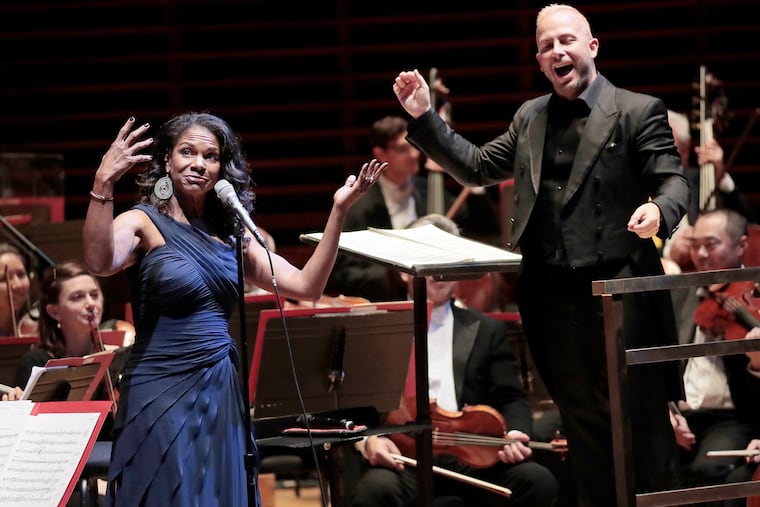Philadelphia Orchestra’s opening night brings Audra McDonald, edgy work and, on the podium, a new blond
An evening that said: Placido who?

Opening night at the orchestra should be light and bubbly. After all, our orchestra has a lot to celebrate these days. Season-openers, though, should also be meaningful, a more iffy proposition that involves casting about for a bit of alchemy.
And yet the Philadelphia Orchestra managed to pull it off Wednesday night in Verizon Hall. Planners behind the orchestra’s gala 120th season opener wove common threads among seemingly disparate artists and repertoire. That the humanity in the orchestral suite from Strauss’ Der Rosenkavalier flowed so beautifully into the triumphant vocalism of soprano Adela Zaharia in a stretch from Verdi’s La traviata wasn’t surprising.
But the leap from there into a piece of 1970s conceptual art by Pauline Oliveros “composed” in part on the spot by the audience — that was a neat trick. And then to proceed directly to a set of tunes sung by Audra McDonald, still all the while making powerful points about humanity, was a virtuoso turn of programming.
It was so virtuoso that you might never have remembered that Placido Domingo had been disinvited from the gala’s stage after publication of an Associated Press article last month detailing allegations of sexual misconduct. Even with that aside, it was hard to visualize how his presence would have been emblematic of a 2019-20 orchestra season devoted to women composers, Beethoven, and new works. Placido who?
Something else had changed since the last time the Philadelphians appeared in Verizon Hall at the end of last season. They are now being led by a blond. Metropolitan Opera patrons may not be able to fully appreciate Yannick Nézet-Séguin’s red-soled and silver-heeled Christian Louboutin leopard-print velvet loafers since in New York his work is in the orchestra pit. But they may take in, as we did, his new short-cropped crown of blond hair, and I think it’s safe to say all this adds up to a visual splash not seen on this orchestra’s podium since Stokowski’s departure eight decades ago.
Nézet-Séguin told the audience that the gala drew more listeners and money than any other since 2008 (the black-tie concert and dinner grossed $720,562, a spokesperson said, with 1,925 attending the concert.)
More so than Stokowski, Nézet-Séguin is a world-class charmer. Oliveros was an edgy, experimental composer, but the conductor prepared the audience for “The Tuning Meditation” from Four Meditations for Orchestra as if explaining the appeal of a warm bubble bath. The lighting on the organ pipes turned a rainbow of colors, and each orchestra musician settled on a different sustained pitch of his or her choosing. It filled the room with a low, diffusely dissonant, insect-like hum.
Then, conductor turned to audience to do the same. “Keep it very calm, very quiet.” They obeyed.
These few minutes, Nézet-Séguin suggested, illustrated how multitudes can accommodate dissenting voices — not an un-useful metaphoric exercise for our time.
“Maybe we make it a tradition,” he told the audience.
This was the first piece the orchestra has ever played by Oliveros, and women were a running theme of the evening, as they are all season. Zaharia’s sound blended particularly well with the orchestra’s strings in “Sempre libera,” and drew some expressive moments from “Ah, fors’e lui” and “E Strano!” before it. Bassoonist Daniel Matsukawa stood in nicely as Alfredo to her Violetta (since there was no tenor in the house).
McDonald arrived on stage, a burst of adrenaline, with “Gorgeous” from the Jerry Bock/Sheldon Harnick musical The Apple Tree, and if anyone doubted that she was, she spent her medium-length set showing gorgeous in all of its meanings. The orchestrations of all of the tunes, augmented by her piano-bass-drums trio, deserve special attention; dramatic intentions were beautifully intensified by the ensemble. The orchestra was better than the best studio orchestra — plush but exacting and with real emotional juice.
The amplification on McDonald could have been stronger. But for the most part, her astonishing range — how she infuses her voice with her acting chops — came through. References to the outside political climate were cloaked in mild language but were still discernible. In introducing “Climb Ev’ry Mountain,” McDonald told the audience the song was about “changing the world with love, and that’s something the world certainly needs now.”
Other music said it even better. A pairing of “You’ve Got to be Taught” from South Pacific and “Children Will Listen” from Sondheim’s Into the Woods merged the ideas that hate is something that can only be learned, and that children are always listening.
Sondheim provided the words.
What do you leave to your child when you're dead?
Only whatever you put in its head.
McDonald gave it the great gifts of subtlety and meaning, gala wrapping or no.